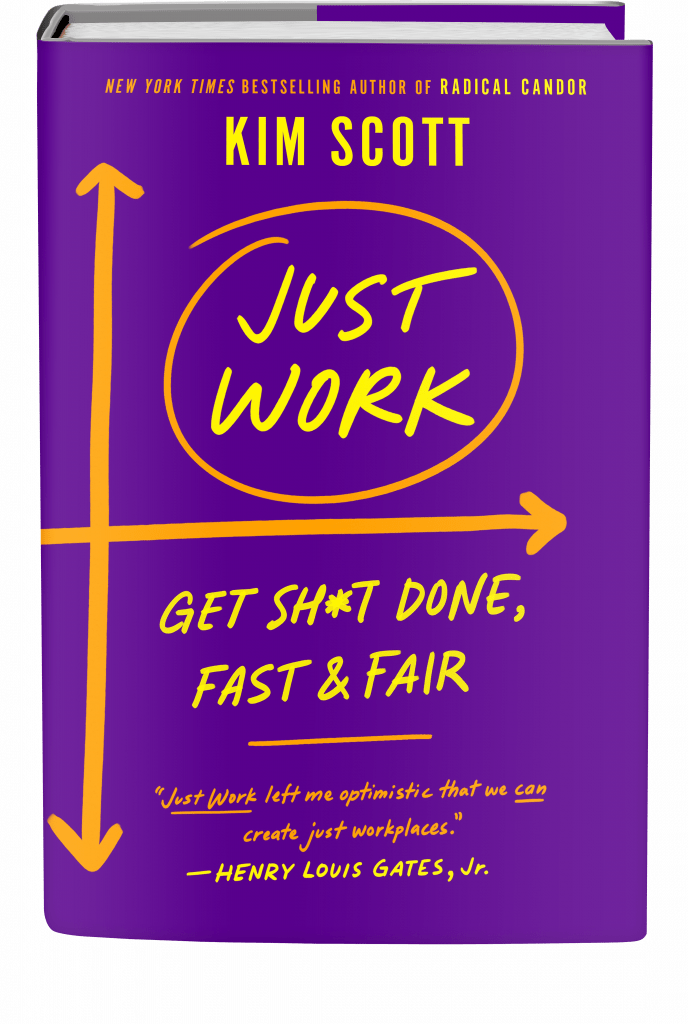Do you ever wonder how the feedback you give others is landing? How about your reaction to the feedback you’re receiving? This giving-and-getting feedback stuff can be tricky. On this episode of the Radical Candor podcast, Amy and Jason talk about how to gauge feedback. In other words, how does the feedback that you give land for the other person? One of the things that we like to say is that Radical Candor is measured, not at the speaker’s mouth, but at the listener’s ear. And, this applies to the feedback you give as well as the feedback you get.
Listen to the episode:
Download the Radical Candor podcast transcript >>
Episode At a Glance
One thing that we’ve learned as we’ve been teaching Radical Candor in different places across the U.S. and around the world, is that people are really nervous about how their feedback might land for the other person. In fact, that’s one of the reasons why they don’t wind up giving it. And the question they ask us is often: How can I make sure that my feedback will never land in a bad way with the other person?
Unfortunately, there’s no way for you to prevent that because we don’t control other people’s feelings and reactions to things. Instead, we want you to focus on actually being fully present in that conversation, paying attention to how the other person is reacting, and being willing to adjust our approach.
When giving feedback, gauge the other person’s response by listening to what they say, observing their body language, looking them in the eye, and asking yourself, “How do they seem to be feeling?” If you’re not sure, you can always ask how what you said landed.
If the person you’re talking to seems upset, this is your cue to take a moment to show you Care Personally.

This is hard because when confronted with someone who seems upset, it’s our natural inclination to back off what we were saying — to move the wrong direction on the Challenge Directly dimension of Radical Candor (increasing the challenge). Instead, now is your time to show that you care — increase the care.
Similarly, when you get an angry response from the person you’re talking to, it’s your cue to move up on the Care Personally dimension.
This can be difficult because when the other person is angry, it’s natural for you to get angry, too. But remember, nothing will move you down on the Care Personally axis faster than anger.
One great way to show you care when confronted with negative emotions from another person is to acknowledge the emotion, for example:
“I’m noticing some strong emotion, what’s coming up for you?”
“My goal was to be helpful, seems I’ve missed the mark.”
“How can I help?”
“What can I do to help get our conversation back on track?”
Often, simply acknowledging the emotion can help someone feel more understood. This is more difficult than it sounds because most people tend to pretend emotions aren’t happening. You might misunderstand the emotion you are seeing; be humble when naming the emotion. And whatever you do, don’t judge the emotion or tell the person they “shouldn’t” be feeling it.
Break Feedback Down to Its CORE
- C — Context (Cite the specific situation.)
- O — Observation (Describe what was said or done.)
- R — Result (What is the consequence that is most meaningful — to you and to them.)
- E— nExt stEps (Discuss the best way to move forward.)
Don’t Get Mad Get Curious
If you’re on the receiving end of someone else’s feedback, and you’re the boss, how you react in the split second someone starts to give you critical feedback is a crucial moment. Fly off the handle and you will set your relationship back months.
Calmly listen and approach the situation with curiosity versus defensiveness. Don’t Get Mad, Get Curious, a handy little phrase coined by Fred Kofman in Conscious Business. Just keep saying that in your head.
What does this mean? If you get deeply curious about the feedback you are receiving, it starts to feel more like a problem to solve. Humans like solving problems. Bonus: this is a problem to solve where the subject is something else humans love: themselves. Sentiments that can really help:
“Ooh. That is interesting. Tell me more about that.”
“Ak! I didn’t realize that by saying that thing that way that I was upsetting the other team? How can we tidy things up there?”
“Oh my gosh, that is so interesting that is how I’m showing up. Am I understanding correctly that you perceive X, Y, and Z?”
Radical Candor Podcast Checklist
1. Remember, Radical Candor is measured not at the speaker’s mouth, but at the listener’s ear; it’s not what you say, it’s how the other person hears it.
2. When giving praise or criticism, pay attention to how the other person is responding, and adjust accordingly. If a person gets emotional, this is your cue to demonstrate you Care Personally.
3. If the person is not hearing you or keeps ignoring what you’re saying, this is your cue to Challenge more Directly; to be more clear. Remember, it’s not mean, it’s clear.
4. When receiving feedback, be aware of your reaction. Taking a moment to get curious about why we’re reacting a certain way can give us insight into ourselves, help interrupt bias, and give us the chance to find valuable nuggets in feedback that might not be skillfully given.
5. One of the best things you can do to understand how to adjust for different people and different cultures is to be clear about your intentions for Radical Candor and then to ask people to gauge your interactions. Knowing how someone else perceived an interaction with respect to how you perceived it will help you adjust in the future.
Just Work is Available Everywhere Books Are Sold!
Order Kim’s new book, Just Work: Get Sh*t Done, Fast & Fair, to learn how we can recognize, attack, and eliminate workplace injustice ― and transform our careers and organizations in the process.
We ― all of us ― consistently exclude, underestimate, and underutilize huge numbers of people in the workforce even as we include, overestimate, and promote others, often beyond their level of competence. Not only is this immoral and unjust, but it’s also bad for business. Just Work is the solution.
Just Work is Kim’s new book, revealing a practical framework for both respecting everyone’s individuality and collaborating effectively. This is the essential guide leaders and their employees need to create more just workplaces and establish new norms of collaboration and respect.
Radical Candor Podcast Listeners Get 10% Off The Feedback Loop
Improvising Radical Candor, a partnership between Radical Candor and Second City Works, introduces The Feedback Loop (think Groundhog Day meets The Office), a 5-episode workplace comedy series starring David Alan Grier that brings to life Radical Candor’s simple framework for navigating candid conversations.
You’ll get an hour of hilarious content about a team whose feedback fails are costing them business; improv-inspired exercises to teach everyone the skills they need to work better together, and after-episode action plans you can put into practice immediately.
We’re offering Radical Candor podcast listeners 10% off the self-paced e-course. Follow this link and enter the promo code FEEDBACK at checkout.
The Radical Candor Podcast theme music was composed by Cliff Goldmacher. Order his book: The Reason For The Rhymes: Mastering the Seven Essential Skills of Innovation by Learning to Write Songs.

